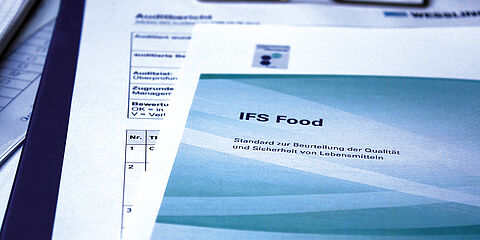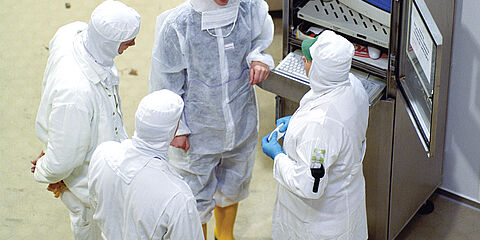Certification standards in the food industry
The production of safe food is being monitored and questioned more and more critically by consumers. For food producers, on the other hand, food safety is their “daily bread”. At the same time, legal requirements, customer demands and certification standards are becoming increasingly complex and the required documentation is now a not insignificant time factor in companies.

Very few companies are still able to manage without proof of their food safety measures, according to the motto: “If it's not documented, it's not done”. This is even more so when it comes to supplying the retail trade, proof through appropriate certification has, today, almost become a matter of course.
But what standards are there today? And which standards make sense and when should they be employed? Accompany us briefly through the current “certification jungle”!

GFSI – Global Food Safety Initiative
The GFSI was established in 2000 as a non-profit organisation. The aim of this organisation is to increase food safety, ensure consumer protection and thus strengthen consumer confidence. The GFSI developed a guideline for this purpose in which the most important food safety requirements were defined. Certification standards that sufficiently fulfil these requirements are recognised accordingly by the GFSI. Today, the GFSI and the standards it recognises are widely accepted worldwide.
The most important food safety standards recognised by the GFSI and most frequently implemented in Germany are:
- International Featured Standard (IFS Food, IFS PACsecure, IFS Broker, IFS Logistics, IFS Wholesale / Cash & Carry)
- British Retail Consortium Global Standard for Food Safety (BRC)
- Food Safety System Certification 22000 (FSSC 22000)

IFS – International Featured Standard
The IFS is a joint project of the German, French and Italian retail associations. Today, IFS Management GmbH (based in Berlin) is the owner of various private sector certification standards, for example IFS Food, Logistics, Broker, Wholesale/Cash & Carry, etc. In Germany, IFS Food is the most frequently encountered food safety standard certified by companies.
Many retail companies require IFS certification from their suppliers. This is accompanied by regular audits or assessments, i.e. checks that the requirements of the standard are being implemented satisfactorily in the company. Since October 2020, there has been a requirement to have such an audit or assessment carried out, unannounced, at least every three years. In addition to IFS Food, IFS PACsecure, IFS Logistics as well as IFS Broker are currently recognised by the GFSI.
BRC – British Retail Consortium Global Standard for Food Safety
The BRC Global Standard for Food Safety is a certification standard developed by the British Retail Consortium and is the most common certification standard for food businesses in the UK. The corresponding standards (BRC Food, Agents & Brokers, Storage & Distribution, etc.) are similar to the IFS certification standards. In terms of content, the same overarching guiding principles of the GFSI are taken up and circumscribed with corresponding requirements. In addition to the different weighting of individual requirements compared to the IFS, there is also a clear difference in the BRC-specific assessment model that is used in the certification process. For companies supplying both UK and German retailers, this often means extending the internal QM system to both standards and undergoing two independent certification audits/assessments once a year.

FSSC 22000 – Food Safety System Certification 22000
The FSSC 22000 was developed by the Foundation for Food Safety Certification based in the Netherlands and is based on the relevant ISO standards. These include the standards DIN EN ISO 9001:2015, DIN EN ISO 22000:2018 and, depending on the scope of the certification, the corresponding standard from the ISO/TS 22002-x series as well as additional requirements from the standard setter itself. Due to this independence, this standard - also recognised by the GFSI - enjoys a high level of acceptance worldwide.
Our conclusion
The standards recognised by the GFSI include the most important criteria for improving food safety within the food production chain. The choice of a certification standard often depends on the requirements of a company's own customers. For example, if supplies are delivered to the German retail trade, certification according to the IFS is often required. When supplying producing companies that are certified according to the FSSC 22000, certification according to this standard can be considered. It is always important to take a long-term view: who will be part of the customer base in the next few years and what demands will these future customers place on their suppliers?
Therefore, our experts at WESSLING provide customers with comprehensive services in matters of food safety. These include individual on-site advice for companies, the review and optimisation of QM documentation, the HACCP concept and the necessary hazard analyses.
Other services include carrying out internal audits/assessments, company and hygiene inspections as well as accompanying external certification audits/assessments. In addition, our experts also conduct QM, hygiene and HACCP training courses.
Your contact for certification standards for the food industry
- WESSLING Food
- +49 2505 89-633
- food@wessling.de



